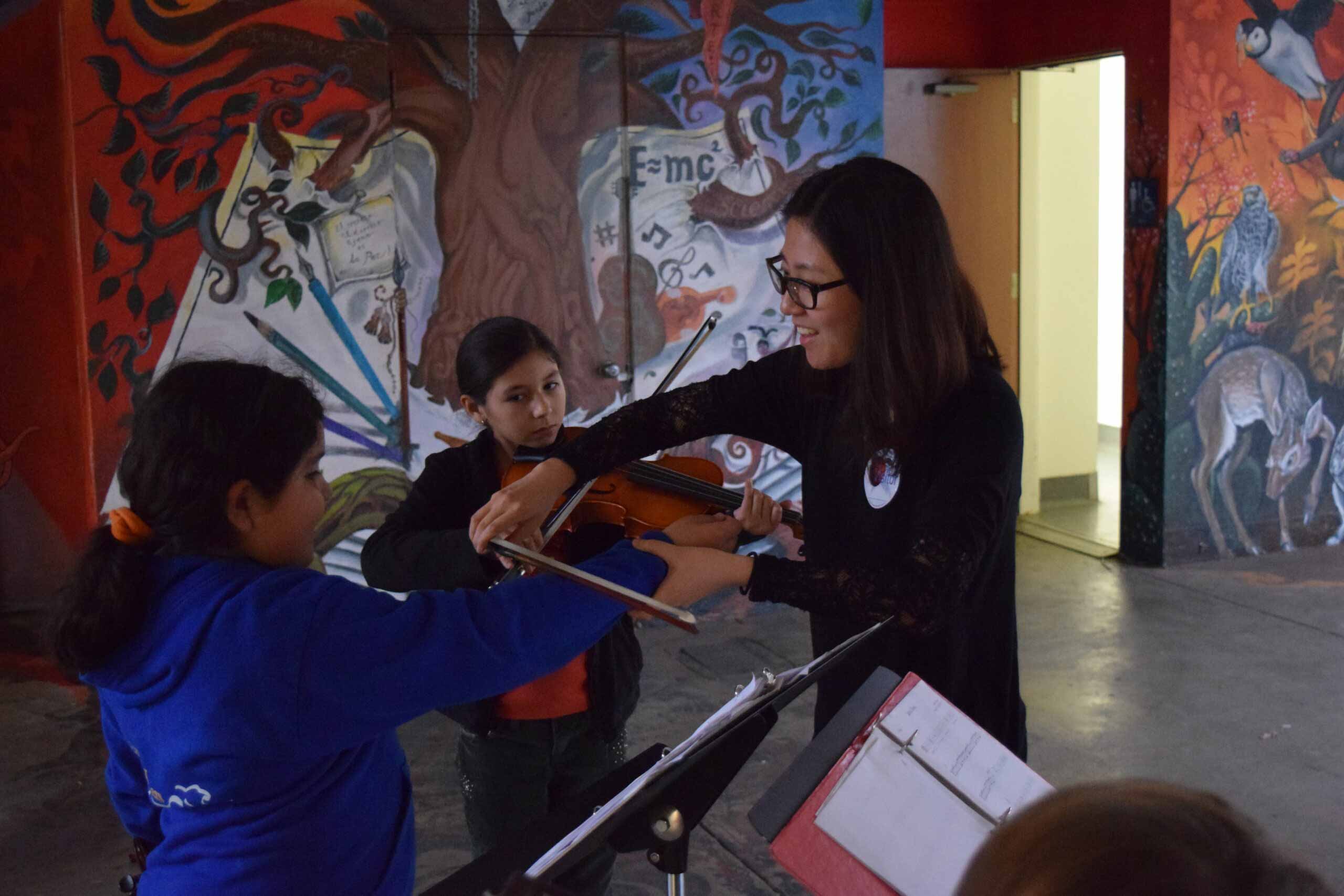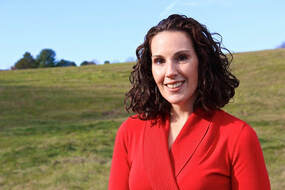Home / Study / Music Education Programs / CAGS
Certificate in Advanced Graduate Degree Studies (CAGS)

Elevate your career in music—apply now for Longy's CAGS program!
Tuition: $8,730
- Asynchronous online
- 15 credits, 5 courses, 1 year
- Taught by active preK-12 educators
- No application fees!
Tailored for preK-12 educators, our Certificate in Advanced Graduate Degree Studies (CAGS) program offers a dynamic opportunity to expand your professional expertise beyond the master’s level or give you a head-start on your advanced degree. Delve into specialized coursework designed to enhance your leadership skills and deepen the practical knowledge you’ll need for the next step of your career in music education. Our customizable curriculum empowers you to address real-world challenges with practical tools based in culturally responsive teaching methods so you can make a difference in your classroom—and the world.
Looking for a master’s program you can complete from anywhere? Check out Longy’s Master of Music in Music Education online program.
Admissions Requirements
- Bachelor’s degree, post-secondary conservatory diploma, or demonstrated equivalent credential required
- Academic and performance record demonstrating the capacity to excel in full-time studies
Curriculum
You choose any five of the following courses:
Adaptive Music Methods
This course will cover the history of special education, an overview of laws and important terms in special education, and an overview of specific disabilities and the Individualized Educational Plan (IEP). Focus will be given to how specific disabilities impact a child’s participation in the music classroom, with attention to collaboration between stakeholders, behavior management, and specific adaptations to music materials. Students will explore strategies through reading resources from veteran educators and self-advocates and workshopping of adapted notation, instruments, and musical arrangements to target specific needs. Upon completion of the course, participants will be able to 1) assess materials and lessons for accessibility, and 2) develop adapted materials and lessons with specific student needs in mind.
Advanced Choral Pedagogy for Elementary School and Middle School
In this deeply reflective course, students will explore the teacher domains of Perception, Facilitator Role, Creative Process, and Artist Communities through a constructivist model for choral classrooms. Students will also gain additional skills and knowledge necessary to help ensure the musical success of their students in the choral setting.
Advanced Choral Pedagogy for High School Choir
This course provides Master of Music Education students advanced skills to teach choir at the secondary level. Musical and non-musical aspects of teaching will be addressed, including the process of creating holistic vocal warm-ups, rehearsal pacing and planning that fosters creativity and student-centered learning, inclusive vocal pedagogy for gender expansive singers, the changing adolescent voice, age appropriate and diverse choral literature, intentional programming, and the continuum of impact in the arts, effective recruitment strategies, etc.
Advanced General Music Methods
Students in this course will explore a spectrum of alternative and traditional music pedagogies within a culturally responsive teaching framework to meet the needs of the children they serve in their communities. Topics include informal music learning, world music pedagogy, hip hop through songwriting, Orff-Schulwerk, Dalcroze and Kodaly/Feierabend. This course will also explore music for social change as it relates to the various pedagogies of general music education.
Advanced Orchestral Methods
Students will learn about methods and materials of orchestral music specific to the middle and high school ensembles. Topics include advanced string pedagogy practices, developing and implementing effective curriculum, appropriate teaching techniques in the orchestral rehearsal, selection of suitable and diverse repertoire for the middle school and high school ensemble and differentiated instruction in the orchestral classroom. Students will further develop their skills and techniques in string pedagogy and will gain experience and skills in performing and conducting orchestral works. Upon completion of the course, learners will be able to review, practice, and apply measurable strategies in the advanced orchestral ensemble class, including instruction based on varying experience levels, students with disabilities, as well as how to establish an equitable culture where all students can thrive.
Concert Band Methods
Students will learn about methods and materials of concert band music mostly catered to middle and high school ensembles. Topics could include wind band history, conducting, literature, instrument pedagogy, performance, and student leadership. Students will further develop their skills and techniques in wind band pedagogy and will gain experience and skills in performing and conducting concert band works, as well as how to establish an equitable culture where all students can thrive.
Curriculum and Assessment
In this course you will learn about curriculum and assessment of music teaching and learning. Pedagogies considered will be general music, choral, and instrumental music programs. Topics to be covered will include curriculum and assessment from both a practical and philosophical view, rubrics and grading systems, self-assessment, and the use of technology in music curriculum and assessment. You will engage in reading, problem solving, analysis, discussion, professional writing, project preparation, and presentation.
Early Childhood Music Education
This course will explore essential music education concepts and fundamental skills throughout early childhood development. Students will gain culturally relevant and applicable skills to use across a wide variety of classroom situations. Core music education standards will also be presented, alongside repertoire and lesson plan development for early childhood. Students will further have opportunities to collaborate with colleagues and education associations to expand their repertoire of music, activities, and skill sets.
El Sistema Principles
The El Sistema Principles course is designed to introduce the history, context, and basic foundations that make some programs “Sistema.” Students will reflect on their own teaching philosophy and its alignment to El Sistema. We will delve into program design and pedagogical choices, with practical examples of how Sistema is implemented, not only in the Venezuela context but across varying examples. Additionally, we will explore some of the challenges and controversies of El Sistema such as Eurocentrism and implications for a program almost exclusively funded by the government. Students will finish the course by synthesizing their key learnings and create an action plan for how to implement certain elements into their respective classrooms, programs, and/or organizations.
Historical and Social Foundations of Music Education
In this course we will look at the history of music education through four strands – pedagogy, advocacy, socio-cultural context, and philosophy. Emphasis will be placed on decentering the European paradigm and on exploring both traditional and contemporary practices of music education globally, as well as in communities in the United States whose contributions to and practices of music education have historically experienced erasure and marginalization. By the end of the course students will have gained important contextualized understandings of music, education, and society that will inform their future work as transformative educators.
Identity and Culture in the Classroom
This course will explore the many ways in which identity impacts educators and students in the classroom, with a focus on developing approaches to creating a culturally responsive classroom environment. Students will analyze common educational repertoire and pedagogy as it relates to cultural competency. Specific focus will be given to assessing how traditional music education curriculum and methods impact students of various backgrounds of race, ethnicity, immigration status, language, socio-economic status, gender, gender identity, sexual orientation, and physical and learning abilities. Upon completion of the course, candidates will be able to assess teaching materials for cultural competency and inclusion in their own educational toolbox.
Modern Band
This course will focus on modern band approaches in popular music, popular music learning in formal and informal settings, songwriting and composition within modern band, and modern band approaches that can be implemented in the traditional classroom setting.
Music as a Healing Art
This course will explore essential concepts, techniques, and skills for utilizing music as a healing art. Students will gain culturally relevant and applicable skills to use across a wide variety of community situations. Essential background knowledge for understanding music’s function as a therapeutic tool will also be presented, alongside therapeutic experiences for various community populations. Students will have opportunities to collaborate with colleagues and associations to expand their repertoire of music, activities, and skill sets.
Non-Traditional Ensemble Composing and Arranging
Learn non-traditional approaches to ensembles in a K-12 classroom—to ensure access and inclusion for students who wish to pursue performance opportunities beyond standard offerings. Focus on composing and arranging music for the students in your room, while ensuring a high-quality, standards-driven ensemble experience, in rehearsal and performance.
Research and Writing Techniques
This course focuses on analytical, argumentative and research writing, with an emphasis on research strategies and the finer points of advanced academic writing. Students will study and learn to utilize various analytical heuristics to improve their reading, critical thinking, and writing skills. Emphasis will be on the methods of process-based research writing, including library and note-taking strategies, using inquiry to guide research, peer-review workshops, and utilizing citation styles like APA. This course runs concurrently (and works collaboratively) with the Master Final Project.
Social and Emotional Learning in the Trauma-Informed Music Classroom
This course provides music educators with the knowledge and skills to integrate social and emotional learning (SEL) within a trauma-informed framework, fostering a supportive and resilient music classroom and ensemble environment. Students will explore the intersection of trauma and its impact on students’ emotional and cognitive development and learn evidence-based strategies to support students’ social and emotional needs. Specific topics include SEL competencies as they relate to music education, strategies for creating a safe and inclusive learning environment, practical applications for lesson planning and classroom management and community building, collaborating with colleagues, families and the surrounding communities and techniques for building strong, supportive relationships with students.
Socially Relevant and Culturally Responsive Teaching
Grounded in educational equity and diversity, learn to carry these principles over to your curriculum and school practices for all students. Learn how to provide equitable access to your core curriculum and maximize academic achievement—for students from all ethnic, race, socio-economic, cultural, academic, linguistic, and other backgrounds.
Technology for Music Education
This course provides tools for you to become active agents of inclusion and responsiveness, paired with the skills and understanding needed to integrate technology most effectively. We will focus on current software and technology standards, lesson ideas, and direct applications that can be made in a preK-12 classroom and ensemble setting.
CAGS Faculty
Erin Zaffini,
Director of Teacher Education
MICHAEL GUTIERREZ,
Administrative Manager of Teacher Education
Ashleigh Cicconi
Heather Cote
Nicole Collins
Sarah Fard
Lorrie Heagy
Eben Fernando Heldreth
Alysia Lee
Monique Van Willingh
Michael Coelho
Ryan Zellner
“Every child is entitled to be inspired by positive musical experiences and to find a ‘home’ and connect with others through music. Just as our close community of music education faculty and students inspire others, we will prepare you to do the same for your students—to influence their lives in ways you have always imagined.”
-Erin Zaffini, Director of Teacher Education

